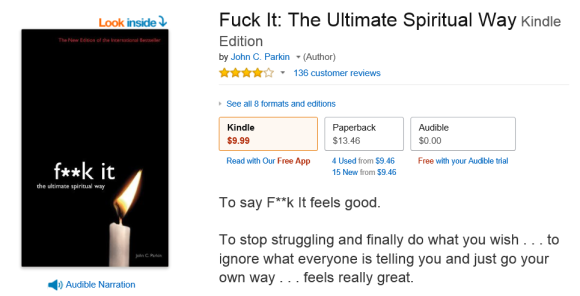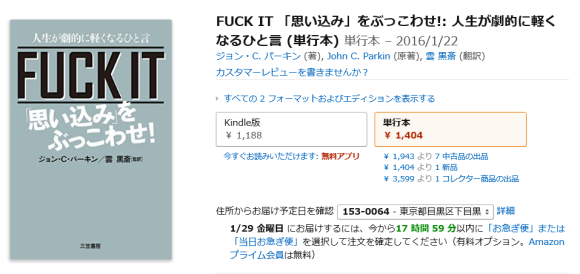Come for the weather report and stock prices, stay for the top-of-the-line profanity.
With a morning circulation of almost three million, Japan’s Nikkei is the largest financial newspaper not only in the country, but in the world. It’s a classy publication, produced by classy people, and for generations the members of Japan’s business elite have been perusing the periodical while sipping their morning cup of coffee or green tea.
Because of that, we imagine a few English-savvy Nikkei readers spewed their beverages all over the paper when they opened up the January 27 edition and saw this:
Lordy Loo! Not sure who signs off on ads in newspapers but think using the F word in the Nikkei might be a first! pic.twitter.com/fG1eCn7Hyr
— Melanie Brock (@melaniebrockjpn) January 27, 2016
This wasn’t a precision strike, either, but a case of carpet F-bombing, with the expletive appearing twice at the bottom of the page.
However, the surprising vocabulary isn’t the handiwork of a disgruntled staff writer who decided to go out in a blaze of profane glory. It’s actually an ad, but nevertheless, this kind of coarse language isn’t generally what one would expect to see within the pages of The Nikki, regardless of who the words are coming from.
While the advertisement’s arguable inappropriateness flew under the radar of many monolingual Japanese readers, it quickly caught the eye of expats, including Peter Landers, the Tokyo bureau chief for The Wall Street Journal.
Just curious ... did the top folks at Nikkei approve of having the f-word printed in big letters on page 3 (albeit in an ad)?
— Peter Landers (@LandersWSJ) January 26, 2016
The question is obviously meant to be tongue-in-cheek, but to answer it seriously, it’s doubtful that The Nikkei, which doesn’t usually attract much in the way of edgy advertising, ordinarily needs to spend much time checking for profanities in submitted ad copy, and when it does, it’s probably not a hands-on project for senior management. And while The Nikkei does have an English language sister publication, the The Nikkei Asian Review, the two papers have separate staffs and run different advertising.
With all the snickering from English-speakers the ad provoked, the ironic thing is that its choice of words is actually the work of Englishman John C. Parkin, author of the self-help book Fuck It: The Ultimate Spiritual Way.
The book’s exact title is somewhat debatable, as online bookseller Amazon’s on-screen text clearly uses “Fuck,” while the English-language cover pulls two punches by rendering the word as “f**k.” The Japanese-language version, though, makes no bones about what it’s really trying to say.
▼ And all in caps, for good measure.
When you take into account that profanity itself is a nebulous concept in the Japanese language, it becomes a little easier to see how someone at The Nikkei could assume that a title chosen by a native English-speaker should be fit to print. Still, to prevent these kinds of embarrassments in the future, it might be a good idea to call down to one of the Nikkei Asian Review editors and have him double-check the next ad that comes in with such large English text in it.
H/T Kotaku USA, Twitter/@melanie_brock
Insert images: Amazon USA, Amazon Japan



 Subaru made a car called the Subaru FU*KS, and here’s how the name could have been even dirtier
Subaru made a car called the Subaru FU*KS, and here’s how the name could have been even dirtier Hey, have you eaten the news? – Japanese “noodle newspaper” comes with writing on the soba
Hey, have you eaten the news? – Japanese “noodle newspaper” comes with writing on the soba Godiva runs full-page ad asking Japanese women to stop buying so much Valentine’s chocolate
Godiva runs full-page ad asking Japanese women to stop buying so much Valentine’s chocolate Foreign shop clerk and Japanese customer fail to communicate because of Japanese language quirk
Foreign shop clerk and Japanese customer fail to communicate because of Japanese language quirk In the mood for meat? Try Lotteria’s $20 Matsuzaka beef burger… for three days only!
In the mood for meat? Try Lotteria’s $20 Matsuzaka beef burger… for three days only! Japan’s new difficult-to-drink-from beer glass protects your liver, but it’s a brutal experience
Japan’s new difficult-to-drink-from beer glass protects your liver, but it’s a brutal experience How to order snacks on a Shinkansen bullet train in Japan
How to order snacks on a Shinkansen bullet train in Japan Demon Slayer: Kimetsu no Yaiba gets new roller coaster attractions and food at Universal Studios Japan
Demon Slayer: Kimetsu no Yaiba gets new roller coaster attractions and food at Universal Studios Japan New Pokémon ice cream, dessert drinks, and cool merch coming to Baskin-Robbins Japan【Pics】
New Pokémon ice cream, dessert drinks, and cool merch coming to Baskin-Robbins Japan【Pics】 Burger King Japan suddenly adds Dr. Pepper and Dr. Pepper floats to its menu nationwide
Burger King Japan suddenly adds Dr. Pepper and Dr. Pepper floats to its menu nationwide Hello, cosmetics! Clinique teams up with Hello Kitty this summer for first-time collaboration
Hello, cosmetics! Clinique teams up with Hello Kitty this summer for first-time collaboration “The most Delicious Cup Noodle in history” – Japan’s French Cup Noodle wins our heart【Taste test】
“The most Delicious Cup Noodle in history” – Japan’s French Cup Noodle wins our heart【Taste test】 To combat declining birth rate, Japan to begin offering “Breeding Visas” to foreigners
To combat declining birth rate, Japan to begin offering “Breeding Visas” to foreigners Starbucks teams up with Japanese shochu brewery for a whole new coffee experience
Starbucks teams up with Japanese shochu brewery for a whole new coffee experience Studio Ghibli releases giant Totoro plushies in Japan
Studio Ghibli releases giant Totoro plushies in Japan Nintendo history you can feel – Super NES, N64, and GameCube controllers become capsule toys
Nintendo history you can feel – Super NES, N64, and GameCube controllers become capsule toys Starbucks releases a cute Frappuccino and Unicorn Cake…but not in Japan
Starbucks releases a cute Frappuccino and Unicorn Cake…but not in Japan Kyoto Tower mascot termination reveals dark side behind cute Japanese characters
Kyoto Tower mascot termination reveals dark side behind cute Japanese characters McDonald’s Japan’s Soft Twist Tower: A phantom ice cream only sold at select branches
McDonald’s Japan’s Soft Twist Tower: A phantom ice cream only sold at select branches Yabai Ramen: What makes this Japanese ramen so dangerous?
Yabai Ramen: What makes this Japanese ramen so dangerous? Finally! Nintendo Japan expands Switch 8-bit controller sales to everybody, Online member or not
Finally! Nintendo Japan expands Switch 8-bit controller sales to everybody, Online member or not Japanese government wants to build luxury resorts in all national parks for foreign tourists
Japanese government wants to build luxury resorts in all national parks for foreign tourists 10 things you should buy at 7-Eleven in Japan
10 things you should buy at 7-Eleven in Japan Studio Ghibli releases anime heroine cosplay dresses that are super comfy to wear
Studio Ghibli releases anime heroine cosplay dresses that are super comfy to wear Woman charged for driving suitcase without a license in Osaka
Woman charged for driving suitcase without a license in Osaka Studio Ghibli unveils My Neighbour Totoro miniature house model
Studio Ghibli unveils My Neighbour Totoro miniature house model Kyoto experiencing problems with foreign tourists not paying for bus fares, but not on purpose
Kyoto experiencing problems with foreign tourists not paying for bus fares, but not on purpose Fighting mild hunger with a Japanese soda that turns into jelly in the stomach【Taste test】
Fighting mild hunger with a Japanese soda that turns into jelly in the stomach【Taste test】 Studio Ghibli’s Howl’s Moving Castle tapestry unveiled in Japan for first time
Studio Ghibli’s Howl’s Moving Castle tapestry unveiled in Japan for first time McDonald’s new Happy Meals offer up cute and practical Sanrio lifestyle goods
McDonald’s new Happy Meals offer up cute and practical Sanrio lifestyle goods Sales of Japan’s most convenient train ticket/shopping payment cards suspended indefinitely
Sales of Japan’s most convenient train ticket/shopping payment cards suspended indefinitely Sold-out Studio Ghibli desktop humidifiers are back so Totoro can help you through the dry season
Sold-out Studio Ghibli desktop humidifiers are back so Totoro can help you through the dry season Japanese government to make first change to romanization spelling rules since the 1950s
Japanese government to make first change to romanization spelling rules since the 1950s Foreigner’s request for help in Tokyo makes us sad for the state of society
Foreigner’s request for help in Tokyo makes us sad for the state of society Ghibli founders Toshio Suzuki and Hayao Miyazaki contribute to Japanese whisky Totoro label design
Ghibli founders Toshio Suzuki and Hayao Miyazaki contribute to Japanese whisky Totoro label design Doraemon found buried at sea as scene from 1993 anime becomes real life【Photos】
Doraemon found buried at sea as scene from 1993 anime becomes real life【Photos】 Tokyo’s most famous Starbucks is closed
Tokyo’s most famous Starbucks is closed Princesses, fruits, and blacksmiths: Study reveals the 30 most unusual family names in Japan
Princesses, fruits, and blacksmiths: Study reveals the 30 most unusual family names in Japan Nintendo: Next console’s OS is not Android
Nintendo: Next console’s OS is not Android Japan Self-Defense Forces join search for boy abandoned by parents in Hokkaido
Japan Self-Defense Forces join search for boy abandoned by parents in Hokkaido Former PM Taro Aso celebrates Obama’s visit with one of his typically inappropriate comments
Former PM Taro Aso celebrates Obama’s visit with one of his typically inappropriate comments What does three months of Yoshinoya beef bowls do to your body? Medical study announces results
What does three months of Yoshinoya beef bowls do to your body? Medical study announces results Get into the tropical summer spirit with a pineapple-flavored McDonald’s shake!
Get into the tropical summer spirit with a pineapple-flavored McDonald’s shake! We read and then eat a rare edition of the Hokkaido Shimbun newspaper made out of kelp
We read and then eat a rare edition of the Hokkaido Shimbun newspaper made out of kelp Nagoya NPO releases survival guide for hikikomori for when their parents are gone
Nagoya NPO releases survival guide for hikikomori for when their parents are gone Foreign comedian Atsugiri Jason’s hot take on Japan’s apology culture has netizens abuzz
Foreign comedian Atsugiri Jason’s hot take on Japan’s apology culture has netizens abuzz Here’s why Japan won’t do anything about the crazy yen surge
Here’s why Japan won’t do anything about the crazy yen surge Meet your favorite Sesame Street characters at Krispy Kreme Doughnuts in Japan
Meet your favorite Sesame Street characters at Krispy Kreme Doughnuts in Japan 23 people arrested in Aichi for operating and using illegal casino during coronavirus lockdown
23 people arrested in Aichi for operating and using illegal casino during coronavirus lockdown Man flips out on train after being confronted for his rude behavior【Video】
Man flips out on train after being confronted for his rude behavior【Video】 Get ready for a cherry-blossom-flavored spring with Sakura Butter potato chips from Calbee!
Get ready for a cherry-blossom-flavored spring with Sakura Butter potato chips from Calbee! Japan to add first new symbol to maps in 13 years, can you guess what it means?
Japan to add first new symbol to maps in 13 years, can you guess what it means? Ueno Station has signs that show ambient sounds as onomatopoeia for deaf passengers
Ueno Station has signs that show ambient sounds as onomatopoeia for deaf passengers
Leave a Reply